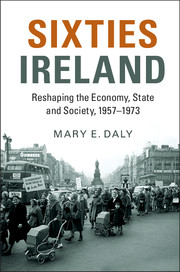Book contents
- Frontmatter
- Dedication
- Contents
- Acknowledgements
- List of abbreviations
- Introduction
- Part I The economy
- Part II Society
- 6 The optimism of a rising tide
- 7 Farewell to ‘the vanishing Irish’
- 8 Women, children and families
- 9 Second-wave feminism and the Irish family
- 10 The churches
- 11 Education, health and welfare
- Part III Politics and international relations
- Conclusion: abandoning the past?
- Bibliography
- Index
9 - Second-wave feminism and the Irish family
from Part II - Society
Published online by Cambridge University Press: 05 March 2016
- Frontmatter
- Dedication
- Contents
- Acknowledgements
- List of abbreviations
- Introduction
- Part I The economy
- Part II Society
- 6 The optimism of a rising tide
- 7 Farewell to ‘the vanishing Irish’
- 8 Women, children and families
- 9 Second-wave feminism and the Irish family
- 10 The churches
- 11 Education, health and welfare
- Part III Politics and international relations
- Conclusion: abandoning the past?
- Bibliography
- Index
Summary
Changing attitudes towards women and children in need – however half-hearted – were partly driven by investigative journalists, including Michael Viney, a new generation of women journalists such as Mary Maher and Mary Kenny and women's pages in the daily newspapers. Catriona Clear noted that Irish women's media had not propagandised ‘anything like Betty Friedan's “feminine mystique” in the 1940s and 1950s. In Irish-produced media at least, Irish women were not subjected to psychological and pseudo-scientific reinforcement of the idealisation of motherhood.’ Such idealisation would not have accorded well with families of five or more children. Life as a housewife, in a modern home equipped with labour-saving devices, whose husband was away throughout the working day, was a relatively new experience for Irish women, and it had scarcely begun when second-wave feminism arrived in the early 1970s. In 1971, the short-lived IWLM published a manifesto Chains or Change which identified ‘justice for deserted wives, widows and unmarried mothers’ as one of five key demands, along with equal pay, equality before the law, equal educational opportunity and contraception. Within a very short time, the movement fractured over which should be the key issues in any campaign, on the modus operandi, and what stance they should take on other political causes, such as the housing action campaign and Northern Ireland. The more mainstream section of women activists concentrated their efforts on issues relating to women and children. The early 1970s saw the emergence of a more radicalised National Association of Widows of Ireland, and the founding of Cherish (1972), a self-help group of single mothers, ADAPT – the Association for Deserted and Alone Parents (1973) and Women's Aid – an organisation that supported battered wives. A greater awareness of the need to protect women and children in violent marriages emerged in Britain and in Ireland at around the same time. The annual reports of the National Society for Prevention of Cruelty to Children (NSPCC) had commonly highlighted instances of ‘domestic violence or ‘wife beating’, but ‘it was acknowledged to be a private matter – not one that affected the public finances’. Second-wave feminism transformed it into a public concern. The focus on the family was core to AIM – Action, Information, Motivation – which lobbied for legislation to enforce maintenance orders; joint ownership of the family home and improvements in welfare payments and legal treatment of women.
- Type
- Chapter
- Information
- Sixties IrelandReshaping the Economy, State and Society, 1957–1973, pp. 181 - 190Publisher: Cambridge University PressPrint publication year: 2016

